Football corruption: Who bought the Copa America?
- Published
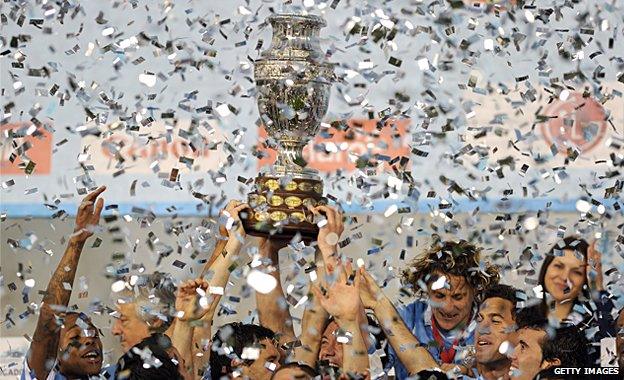
Uruguay won the Copa America in 2011 but the real winners may have been those controlling the commercial rights to the tournament
Much of the coverage of the Fifa corruption scandal has focused on bribery surrounding the World Cup and the colourful characters of Sepp Blatter, Jack Warner and Chuck Blazer.
However, the majority of the US indictments announced a fortnight ago actually concern the fight to control the commercial rights for international football in the Americas and in particular the continent's most celebrated tournament: the Copa America.
While former Fifa vice-president Jack Warner is accused of arranging a $10m (£6.5m) bribe to support the South African 2010 World Cup bid, another vice-president, Eugenio Figueredo, is accused of involvement in bribes around the Copa America of $100m.
He is one of at least 11 members of Conmebol, the South American football confederation, accused of having taken corrupt payments from a sports marketing company in return for the commercial rights for the next four Copa America tournaments - including the one that begins this week in Chile.
Buying the Copa
The Copa America is one of the most watched sporting events in the world.
In 2011, it was estimated that the cumulative audience for the tournament was over five billion people. And, much like the World Cup, the value of the tournament has increased hugely in the past three decades.
The worldwide commercial rights for the 1987 Copa America were sold for $1.7m. The same rights for this year's tournament brought in $75m.
A special centennial tournament celebrating one hundred years of the Copa America, to be held in the USA in 2016, has resulted in a $112.5m windfall for the confederations organising it.
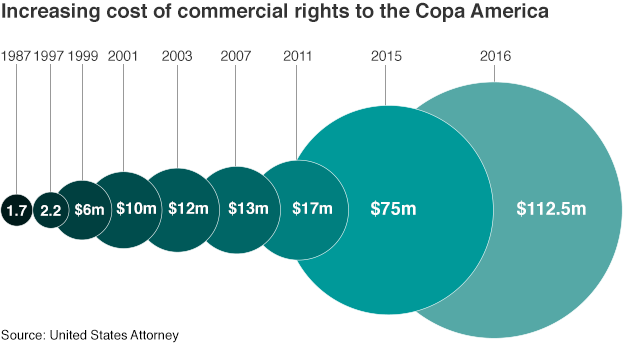
Since 1986, all of those commercial rights to one of the biggest football events in the world have been largely controlled by one company: Traffic Sports.
The company name may recall its early years selling advertising for bus stops but it eventually became the most important sports marketing group for football on the continent.
For the 2007 tournament alone, according to internal financial records seen by the FBI, Traffic's revenue from selling broadcasting and marketing rights around the Copa America was $74.2m, bringing in a profit of $29.1m.
But the indictment published by the US Department of Justice (pdf), external accuse the company of securing its exclusive rights to the Copa America by bribing officials at Conmebol for the past 30 years.
It alleges that executives of Traffic and associated companies paid bribes to two Conmebol presidents and up to nine other presidents of national football associations, including the then presidents of the Brazilian and Argentine associations.
Extra payments
The earliest case of bribery cited by the US Attorney is from 1991, when Nicolas Leoz, the president of the South American football confederation, asked Jose Hawilla, the owner and founder of Traffic, for a payment for his signature.
Mr Leoz is said to have told Mr Hawilla that the rights to the Copa America were going to make Mr Hawilla a lot of money and Mr Leoz would not sign the contract on behalf of Conmebol unless Mr Leoz was given a six-figure sum in return.
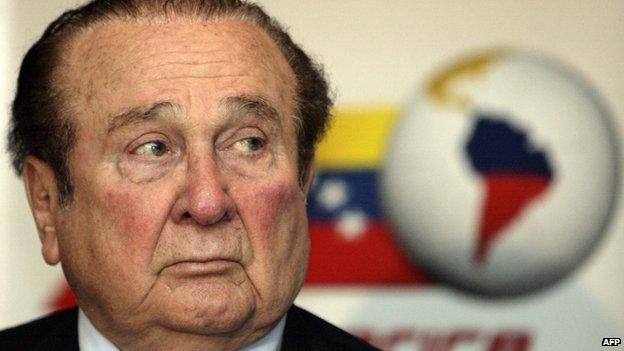
Nicolas Leoz, former president of Conmebol, is accused of taking six-figure bribes in return for awarding Copa America contracts for almost 20 years
The indictment says Mr Leoz then asked for additional payments each time the tournament rolled around and by the final Copa America during his time as president, in 2011, he was receiving more than $1m per tournament.
And it seems that the word spread.
In 2007, when the Copa America was played in Venezuela, the president of the Venezuelan football federation, Rafael Esquivel, asked Traffic for $1.7m for his continued support of their exclusive rights to the tournament.
Once again, Traffic paid up, with the corrupt payments fraudulently wired and laundered through banks and businesses in the US and elsewhere.
Winning over the competition
Then, in 2010, it looked like Traffic had been outmanoeuvred, and possibly out-bribed, by two other sports marketing groups.
Six of the national football association presidents in Conmebol seem to have helped wrestle the Copa America away from Traffic and award the commercial rights to one of their competitors: Full Play.
Traffic responded by taking both Full Play and Conmebol to court in the US, arguing the new contract infringed on its agreement because it included the Copa America 2015, for which it already had already purchased the rights.
The case never reached a hearing.
Instead, Traffic and Full Play settled out of court and agreed to join with a third group, Torneos y Competencias, to create a new company, called Datisa, and share the riches of the Copa America between them.
Step up
And, at this point, the corruption seems to hit a whole new level, according to the indictments.

In the earlier contract for the 2011 Copa America, Traffic International is said to have paid somewhere in the region of $3m in bribes divided between three officials.
Now, during the negotiations over forming Datisa, Mr Hawilla was informed that bribes had already been agreed with several other Conmebol officials and he would have to chip in with his share. Mr Hawilla was told that $10m should cover his portion of these expenses to date.
It is alleged that Datisa ultimately agreed to pay a total $100m for the rights to four tournaments.
Those payments were to be divided between 11 Conmebol officials and paid for each tournament until 2022:
$3m each for the presidents of Conmebol and the Brazilian and Argentine federations
$1.5m each for seven other national association presidents
$500,000 to another Conmebol official
Plus there was an extra one-off payment paid to each of these people for their signature on the initial contract.
This initial payment was structured in the same way as the payments agreed for each tournament, with the "big three" again pocketing $3m each.
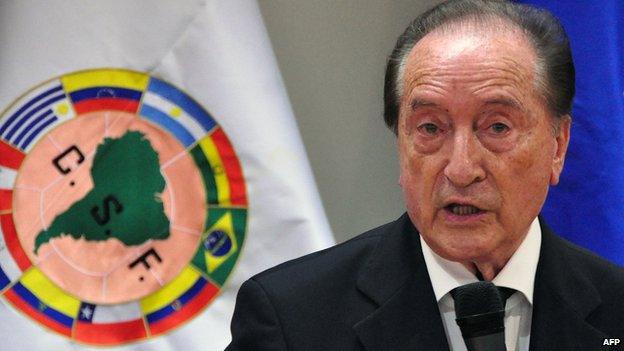
Eugenio Figueredo was president of Conmebol when the members of the executive committee arranged for $100m of bribes
In fact, of the 12 Conmebol signatures on the contract, it seems possible that only one was not paid for.
To put the scale of the corruption into clearer context: the official deal for the four Copa America tournaments was $317.5m.
For that, Datisa paid $100m in bribes - almost a third of the value of the rights.
Or to put it another way, if the corrupt payments for the contract are averaged out across the tournaments, then Datisa appear to have paid just under $1m in illegal bribes for every match at the Copa America - including the tournament that is about to begin.

While all this was happening in South America, Traffic's North American division, Traffic USA, was also buying up the rights to international football.
The commercial rights to the Gold Cup, the Concacaf (Confederation of North & Central America and Caribbean Football) version of the Copa America, were purchased in 1994 by Traffic USA with the promise that they could turn the tournament into a success story in the same way as they had the Copa America.
Concacaf's president, Jack Warner, and the general secretary, Chuck Blazer, were paid hundreds of thousands of dollars in bribes relating to the contracts.
Later, when Jack Warner resigned following allegations of corruption, his successor, Jeffery Webb, arranged for $2m to find its way to him as part of a deal for the Gold Cup and the North American Champions League.
In addition to the money paid out to secure the Gold Cup, Traffic was also dealing with the presidents of the Costa Rican and Nicaraguan football associations, who, along with Jack Warner, had requested six-figure bribes for awarding the rights to World Cup qualifiers played in their countries.
Licence to make money
And all the while, Traffic were making money from these exclusive rights - selling them on to broadcasters, sports companies and other commercial sponsors across the continent and around the world.
In particular, there was a boom in profits in the US and Canada, which quickly became a major market for the Copa America.
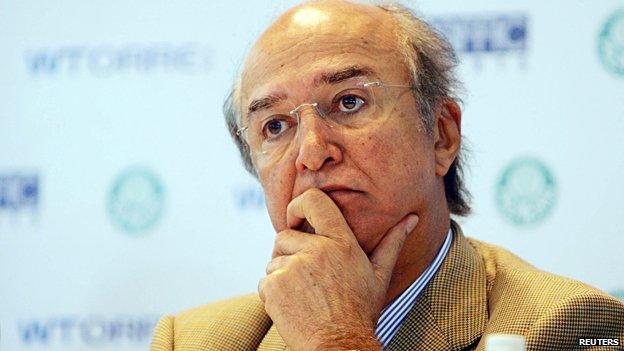
Jose Hawilla, has now admitted his part in corruption and his companies role in paying officials for commercial rights to the Copa America
According to the indictment, in 2007 the US and Canadian broadcasting rights brought in $12.8m for Traffic - the highest amount of any region and making up a fifth of the company total revenue for the tournament.
This rapidly expanding market helped drive the increase in the value of the contracts and, alongside them, the hidden cost of doing business with the continent's football officials.
The owner and founder of Traffic Sports, Mr Hawilla, has now admitted his part in extortion, fraud, bribery and money laundering and agreed to forfeit $151m of illegal earnings.
Hugo Jinkis, Mariano Jinkis, and Alejandro Burzaco have all been charged as co-conspirators in the illegal payments to officials by Datisa.
Many football officials are under arrest, charged or being sought by the US authorities for questioning.
Meanwhile, in Chile, the hosts take on Ecuador in the opening match of the Copa America 2015, with Chile hoping to get off to a positive start as they look to win their first ever Copa America.